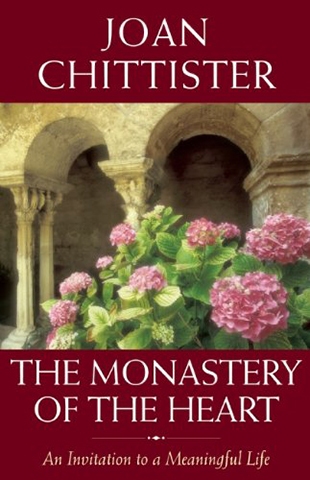After more than 50 years of life in a monastery, Sister Joan Chittister asked herself some questions. What — if anything — of monastic life is worth passing on to others in our time? What does monasticism offer seekers who are already overwhelmed by all the spiritual and secular options available to them? And how can those outside traditional monasteries embrace this life that is both enriching and enlightening? Her answer: a Monastery of the Heart, open to people of all faiths and even no faith.
Chittister is a bestselling author and executive director of Benetvision, a resource and research center of contemporary spirituality. She is profiled at Spirituality & Practice in the Living Spiritual Teacher Project. In partnership with Benetvision, we are presenting an online retreat based on this book titled Creating a Monastery of the Heart.
Chittister's adventuresome vision of a monastery for those who choose not to live inside a monastery is based on the 1,500 year-old Rule of Benedict which is filled with sturdy insights and everyday practices. For Benedict of Nursa, she explains, "the spiritual life lay in simply living this life, our daily life, well. All of it."
The first challenge to those who would live a spiritual life in the midst of the world is to immerse themselves in the Word of God, under the impulse of the Spirit, and to set out to bring about God's peaceable kingdom. Chittister focuses on "the intimate enterprise of the search for God" but makes it clear that the Benedictine Rule reveals that the preeminent form of the spiritual journey is in community life. This prompts a question: Who would be part of your community of the heart and how would you connect and fulfill your common vision?
In a section on "Our Interior Life," Chittister covers prayer as immersion in the mind of God, silence as protection from our noisy selves, prayerful reading a part of our lifelong conversation with God, and retreat and reflection as stoking the fire of fidelity. The author defines community as the essence of soul and discusses its lineaments of mutuality, equality, sufficiency and sharing, and nourishment.
The whole point of the Monastery of the Heart is service of others and that includes good work, co-creation with God, loving care, responsibility, and hospitality. Of the last form of service, Chittister writes that this community must have "stretchable, permeable, illimitable boundaries made up of anyone who happens to come into it at any time, and always saying, 'We are here for you.' "
Everyday spirituality is a hallmark of the Rule of Benedict where nothing is too little or inconsequential. It is characterized by "God-with-us everywhere at every moment." With a listening and stable heart, we make our way one day at a time attuned to the Spirit.
Chittister hits high stride in the final section of the book, "Our Spiritual Growth," where she elucidates humility as a 12-step process leading to the "perfect love" of God which "casts out fear." Other vehicles pointing toward spiritual maturity are sacred art, good zeal, and justice as the way to peace. In the poetic epilogue, Chittister salutes the ways in which the Monastery of the Heart calls us to the more of life (peace, humility, serenity, study, prayer and openness) while also tutoring us in how less is more:
less jealousy means more contentment,
less need for things means more satisfaction,
less self-centeredness means more happiness,
and less corrosive personal ambition
leaves more room
for the loving presence of God.
